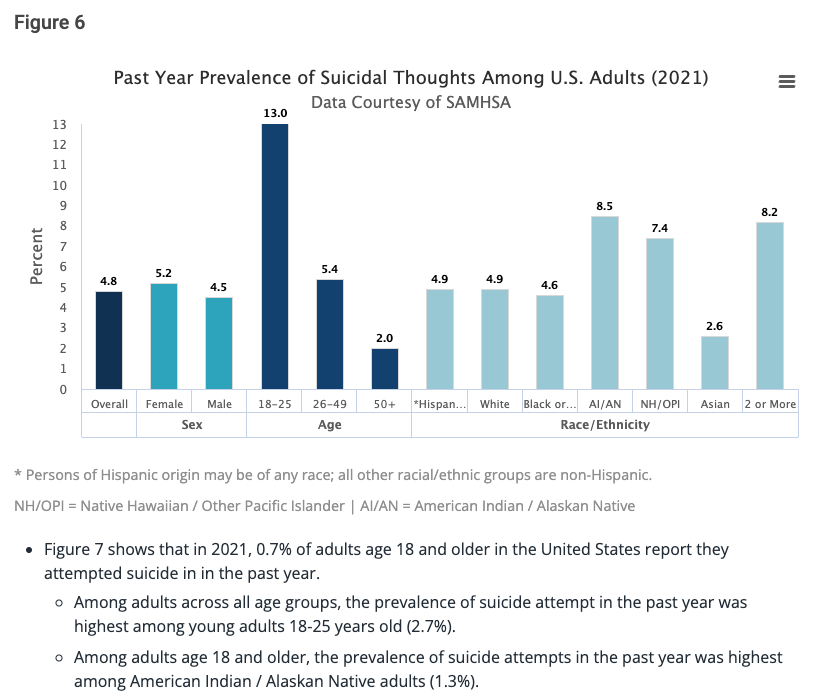In a recent talk by former monk Jay Shetty, he pointed out how fixated our culture is on happiness. When someone has a birthday, we wish them a “happy birthday.” We prefer our stories to end with “happily ever after.” And our music echos this as well with Bobby McFerrin singing, “Don’t worry, be happy.” Even the U.S. Declaration of Independence exalts the pursuit of happiness. However this obsession with happiness also causes us a great deal of anxiety. Furthermore, it perpetuates misconceptions about mental health.
Mental health is an essential aspect of our overall well-being, yet it remains one of the most stigmatized topics in our society. If it’s good to be happy, then it must be bad to be sad. This stigma not only affects those who are struggling but also hinders our collective efforts to prevent suicide and promote mental health awareness. In this blog post, we’ll explore the stigma surrounding mental health and suicide, its consequences, and how we can collectively break the silence and create a more compassionate and understanding narrative.
Who’s Most at Risk and Defining the Stigma

Stigma refers to the negative stereotypes, discrimination, and prejudice associated with a particular characteristic or condition. When it comes to mental health and suicide, this stigma often manifests in several harmful ways. In the United States, the group most impacted by these stigmas and the mental health crisis are young adults between the ages of 18-25 years.
Misconceptions
Many people hold misconceptions about mental health conditions, assuming that those who experience them are “crazy” or “weak.” There is a famous quote by David Foster Wallace that states,
“The so-called ‘psychotically depressed’ person who tries to kill herself doesn’t do so out of quote ‘hopelessness’ or any abstract conviction that life’s assets and debits do not square. And surely not because death seems suddenly appealing. The person in whom Its invisible agony reaches a certain unendurable level will kill herself the same way a trapped person will eventually jump from the window of a burning high-rise. Make no mistake about people who leap from burning windows. Their terror of falling from a great height is still just as great as it would be for you or me standing speculatively at the same window just checking out the view; i.e. the fear of falling remains a constant. The variable here is the other terror, the fire’s flames: when the flames get close enough, falling to death becomes the slightly less terrible of two terrors. It’s not desiring the fall; it’s terror of the flames. And yet nobody down on the sidewalk, looking up and yelling ‘Don’t!’ and ‘Hang on!’, can understand the jump. Not really. You’d have to have personally been trapped and felt flames to really understand a terror way beyond falling.”
― David Foster Wallace
Fear of stigma can deter individuals from seeking professional help, even when it’s desperately needed, potentially exacerbating their conditions.
Silencing Conversations and Social Isolation
Due to the stigma, individuals may feel compelled to hide their struggles, making it difficult for them to seek help or share their experiences. Stigmatization can lead to social isolation, as people may fear rejection or judgment from friends, family, and colleagues.
Breaking the Silence

Addressing the stigma surrounding mental health and suicide is crucial for creating a more compassionate and supportive society. Here are some steps we can take.
Education and Awareness
Promote mental health education and awareness campaigns to dispel myths and misconceptions surrounding mental health. Encourage open and non-judgmental conversations about mental health and suicide within families, workplaces, and communities. This month on September 15, 2023 Water’s Edge Counseling is holding a breakfast and Risk Assessment Workshop. It’s completely free and open to all community helpers that work with children and adolescents. If interested, please sign up here.
Advocacy and Supportive Environments
Create safe spaces where individuals feel comfortable discussing their mental health challenges and seeking help. Support organizations and initiatives that work to reduce stigma and provide resources for mental health and suicide prevention. Furthermore, practicing empathy and compassion when interacting with individuals who may be experiencing mental health challenges can go a long way in breaking down barriers.
Start Receiving Support From Therapists in Savannah, GA
The stigma surrounding mental health and suicide is a pervasive issue that impacts millions of lives. By acknowledging the problem, promoting understanding and compassion, and actively working to break the silence, we can create a society where people feel supported, heard, and empowered to seek help when they need it most. Together, we can make a difference in the lives of those affected by mental health conditions and suicide. If you’re interested in counseling, please connect with a professional counselor at Waters Edge Counseling. Our team would be honored to offer support from our Savannah, GA-based practice. You can start your therapy journey by giving us a call at 912.319.5552 or emailing us at [email protected]. If you or someone you know is experience suicidal thoughts or behaviors please call 911 or the National Suicide Hotline at 988. You can also find more resources on suicide prevention here.
Other Services Offered With Waters Edge Counseling
We understand that you may experience issues with more than one mental health concern at a time. This is why we are happy to offer support with a variety of mental health services. Our team is happy to offer support with multiple mental health services including online counseling, clinical supervision, coping after a cancer diagnosis, and SCAD student counseling. We are also happy to offer therapy for anxiety, depression, eating disorders, substance abuse, teen substance abuse, and counseling for men. In addition, we also offer counseling for teens, child counseling, family counseling, Christian counseling, grief counseling, and marriage counseling.
Please note: While this blog is designed to help people achieve their goals, the information within each post is not a substitute for therapy or medical advice given by a licensed professional.

